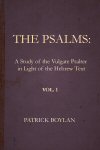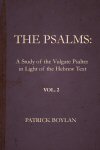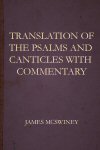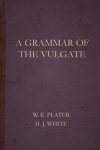Translation of the Vulgate Collection (4 vols.)
Digital Logos Edition
Overview
The Translation of the Vulgate Collection brings together essential reference texts and translations of the Vulgate Psalter, all at your fingertips. These classic works were especially designed to help you understand the breviary and the Latin liturgy better while growing your knowledge of the ecclesial Latin. With key translations and commentaries that compare the Latin Vulgate with the original Hebrew Psalms—as well as a grammar specifically composed with biblical Latin in mind—these works will help transform your ecclesial Latin studies.
Experience these works in Logos to understand the difference. With a click, look up Latin, Greek, Hebrew, or Aramaic terms in dictionaries you trust. Compare these translations side-by-side with other Vulgate Bibles in your library, or see how the various translations differ from the modern Roman Missal or your favorite breviary.
Translation of the Psalms and Canticles with Commentary will be downloaded as three resources: commentary, translation of the Hebrew text, and translation of the Vulgate text.
- Provides multiple translations of the Psalms from linguistic experts
- Contains extensive introductions and notes on the translational choices of the psalms and canticles
- Includes a grammar written exclusively for the Latin of the Vulgate
- Bridges difficulties between modern English; biblical Greek, Hebrew, and Aramaic; and ecclesial Latin
- Title: Translation of the Vulgate Collection
- Volumes: 4
- Pages: 1,539
- The Psalms: A Study of the Vulgate Psalter in Light of the Hebrew Text, vol. 1, 2nd ed. by Patrick Boylan
- The Psalms: A Study of the Vulgate Psalter in Light of the Hebrew Text, vol. 2, 2nd ed. by Patrick Boylan
- Translation of the Psalms and Canticles with Commentary by James McSwiney
- A Grammar of the Vulgate by W. E. Plater and H. J. White

A side-by-side literal comparison of the Latin Psalter and the English translation, this resource has withstood the test of time and is still is a standard text in studies of ecclesiastical Latin. Each psalm has introductory notes, commentary on each verse, and cross-references to parallel passages. Volume 1 contains a thorough introduction to the Vulgate Psalter and a translation of and commentary on Psalms 1–71.
Patrick Boylan was professor of sacred Scripture and Oriental languages at St. Patrick’s College at Maynooth and also professor of eastern languages at University College in Dublin. Hailing from Ireland, Boylan wrote articles for the Irish Quarterly Review, The Irish Theological Quarterly, and The Catholic Bulletin.

The Psalms: A Study of the Vulgate Psalter in Light of the Hebrew Text, vol. 2
- Author: Patrick Boylan
- Edition: 2nd
- Publisher: M. H. Gill & Son
- Publication Date: 1921
- Pages: 405
A side-by-side literal comparison of the Latin Psalter and the English translation, this resource has withstood the test of time and is still is a standard text in studies of ecclesiastical Latin. Each psalm has introductory notes, commentary on each verse, and cross-references to parallel passages. Volume 2 contains a thorough introduction to the Vulgate Psalter and a translation of and commentary on Psalms 72–150.
Patrick Boylan was professor of sacred Scripture and Oriental languages at St. Patrick’s College at Maynooth and also professor of eastern languages at University College in Dublin. Hailing from Ireland, Boylan wrote articles for the Irish Quarterly Review, The Irish Theological Quarterly, and The Catholic Bulletin.

A comparison of the Latin Vulgate in English and the Hebrew Psalms in English, this text contains thorough notes through each Psalm, cross-references other biblical texts, references to numerous targumim, and word comparisons for variants appearing in or related to Arabic, Syriac, Greek, and other languages.
James McSwiney was a Jesuit scholar and a priest.

An introductory grammar to the study of the ecclesial Latin used in the Vulgate, A Grammar of the Vulgate distinguishes classical Latin from Roman Catholic usage by tracing the history of the Vulgate and returning to the Vulgate’s source—biblical Greek and Hebrew. From there, the grammar begins to discuss word form and syntax, explaining the Latin of the Vulgate using textbook rules and methodology.
Henry Julian White (1859–1934) was a biblical scholar educated at Oxford. He was ordained in 1886 and appointed domestic chaplain under John Wordsworth. He taught from 1895 to 1905 and was dean of Christ Church at Oxford. During his time at Oxford, he assisted Wordsworth in his edition of the Vulgate Bible.
W. E. Plater was rector of Halstock, in southwest England.